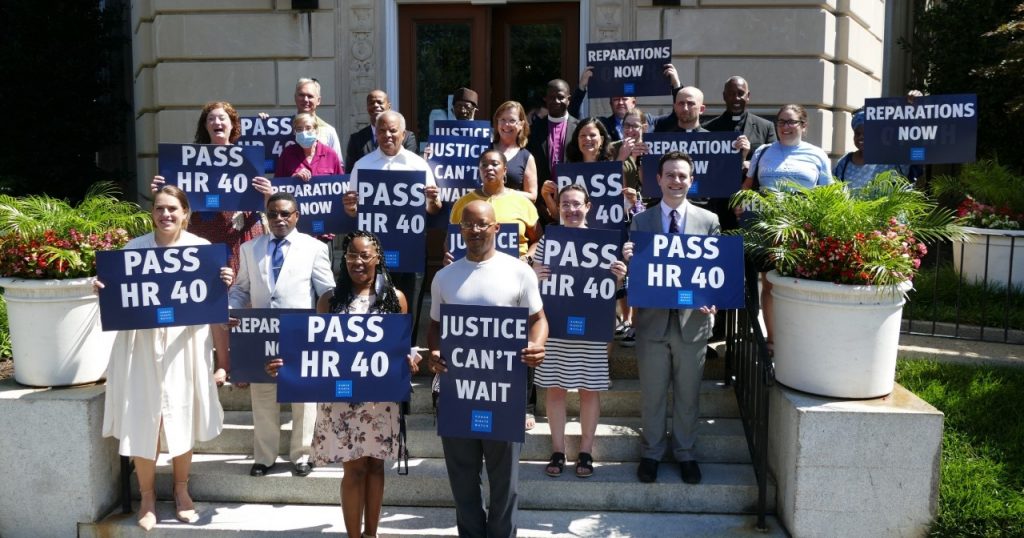Faith leaders turn up the heat in DC, urging Congress to take up H.R. 40
An interfaith group of religious leaders came together in Washington, D.C., on Tuesday, July 13, to urge lawmakers to follow the words of the prophet Isaiah: “Learn to do good; seek justice.”
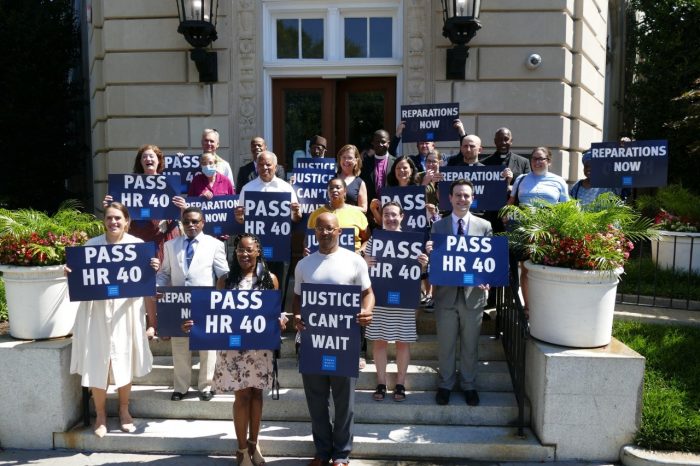
They called on Congress to pass H.R.40, a bill to study the legacy of slavery, its ongoing harms, and produce proposals for repair.
The group gathered at the United Methodist Building, in the shadow of the Capitol, “to turn up the heat on Congress and get them to pass this bill,” said the Rev. Jim Winkler, president and general secretary of the National Council of Churches, referencing the hot, sultry day in Washington.
Not unprecedented
Representing 38 member communions and over 30 million church members in 100,000 local congregations, Winkler spoke in favor of H.R 40. It would create a commission to study the history of enslavement and discrimination in the United States and develop reparation proposals for African Americans.
He noted that the legislation had been introduced year after year by the late Rep. John Conyers of Michigan, without action. It was most recently brought forward in January by Rep. Sheila Jackson Lee of Texas.
“This bill simply aims to establish the merits of reparations for African Americans for the 250 years of slavery they endured,” Winkler said. “Just the merits. That in itself is threatening to a whole lot of people in this nation who want to accept the consequences of slavery are over and done with.”
It is not only the right thing to do, Winkler said; it’s also not unprecedented in U.S. history. He noted that, in 1988, Ronald Reagan apologized for the illegal internment of Japanese Americans during World War II and signed into law the Civil Liberties Act of 1988, making reparations to each former internee.
‘Legacy of slavery continues’
Well over a dozen people from religious bodies, including the Episcopal Church, Evangelical Lutheran Church in America, National African American Clergy Network, the Presbyterian Church (USA), Union of Reform Judaism and the UCC, joined other advocates in urging Congress to make history and bring the legislation to the House floor this session.
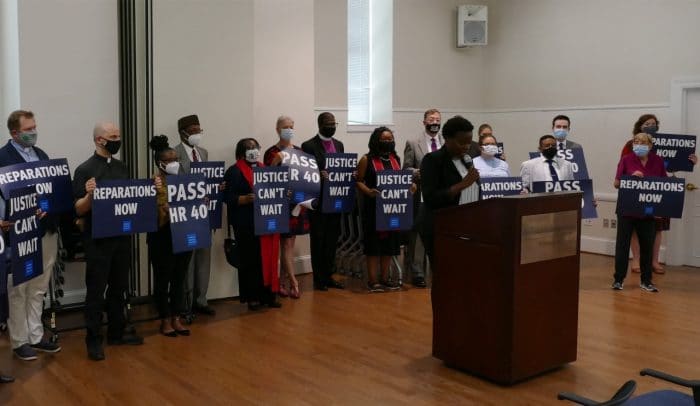
“In the last 25 years, this legislation has not come to pass,” said Laura Kigewba James, program coordinator for grassroots organizing with the General Board of Church and Society of the United Methodist Church. “And yet the legacy of slavery continues to remain as a reality in structural racism and violence that has been hard on myself and all of our communities.”
“As a church we have actively made efforts for justice and repair to occur … but as a nation we have yet to address the legacies of our violent past and the need for repair,” she said. “As a nation, we must honor and protect the sacred dignity and worth of all persons.”
UCC presence
The Rev. Sekinah Hamlin, minister of economic justice, represented the UCC along with Sandy Sorensen, director of its D.C. office. The Rev. Tim Tutt, senior minister of Westmoreland Congregational UCC, Bethesda, Md., spoke for the group, drawing on the prophet Isaiah.
“’Learn to do good; seek justice,’” he said. “Those words sum up much of what we in the United Church of Christ — and our colleagues from so many traditions who are here today — see as our calling of living out our faith in the world. ‘Learn to do good; seek justice.’
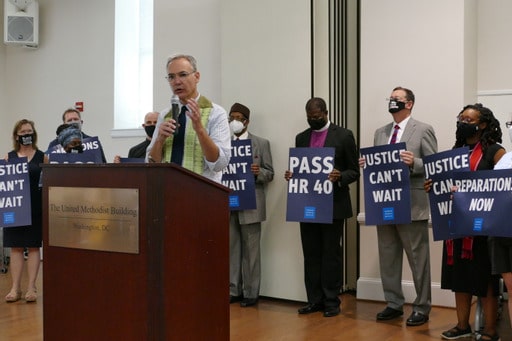
“In the United Church of Christ we work to do good and seek justice by caring about creation, supporting LGBTIQ+ persons, working to end medical debt, seeking a world free from war, striving for economic justice and working for racial justice.
‘How to do good’
“H.R. 40 is one way our nation can learn better how to do good,” he continued. “H.R. 40 doesn’t authorize reparations payments or offer any specific remedy, but here’s what we know: No amount of money will be great enough to cover the cost of indignity and oppression, and no amount of money is too small to begin a process in good faith of repairing the breach. We have much work to do. Bring H.R. 40 to the floor for a vote …
“Black families hold less wealth than white families. School districts that serve higher populations of Black and brown student receive less funding than those that serve white students. End-of-life care under Medicare costs more for dying Black Americans than for white Americans. Racial injustice is real and it is costly. ‘Seek justice,’ Isaiah said. H.R. 40 will not solve all of our problems. It will move us in the direction of being a more perfect union.”
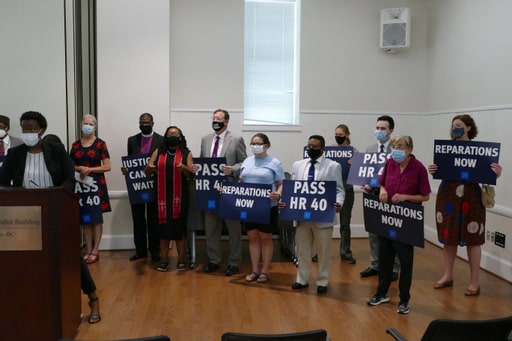
A number of UCC congregations are already involved in the work around reparations. Hamlin later said the effort to bring H.R. 40 to the House floor is “part of our Isaiah 58 call of repairing the breach to create a just world for all.”
“Our support of H.R. 40 is connected to our commitment to racial justice,” she said, noting that the issue is tied to the UCC’s “Join the Movement Toward Racial Justice” campaign, launching this week during the church’s online General Synod.
“H.R. 40 would establish a 13-member commission to document and develop redress options for:
- the role of the federal and state governments in supporting the institution of slavery,
- the discrimination in the public and private sector against descendants of enslaved Africans, and
- the continuing residual effects of racist policies and laws on African Americans and society.
“Do justly. It’s a simple concept.”
Reach out to members of Congress and urge them to pass H.R. 40 with this action alert.
Related News
A Moment of Silence
The weekend news was alarming. Two students shot and killed with 9 injured at Brown University...
Read MoreIn hope-filled worship service, UCC and United Church of Canada celebrate full communion past and future
On Saturday, Dec. 13, many from the United Church of Christ (UCC) and the United Church of...
Read More‘A Gift of God to the World:’ Christmas greetings from the General Minister and President
As Christmas quickly approaches, UCC General Minister and President/CEO the Rev. Karen Georgia...
Read More